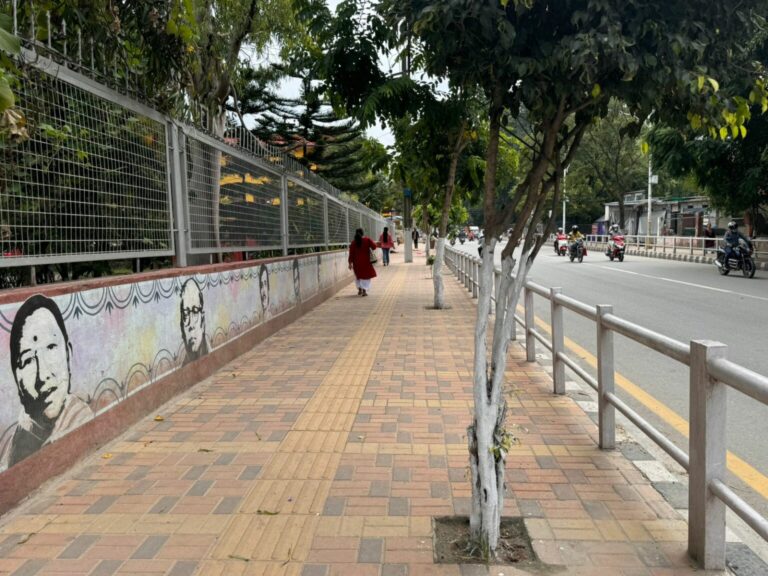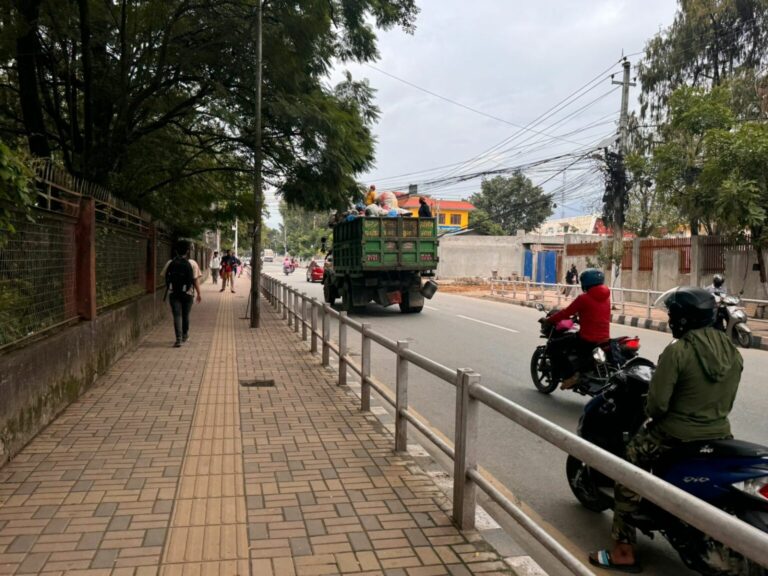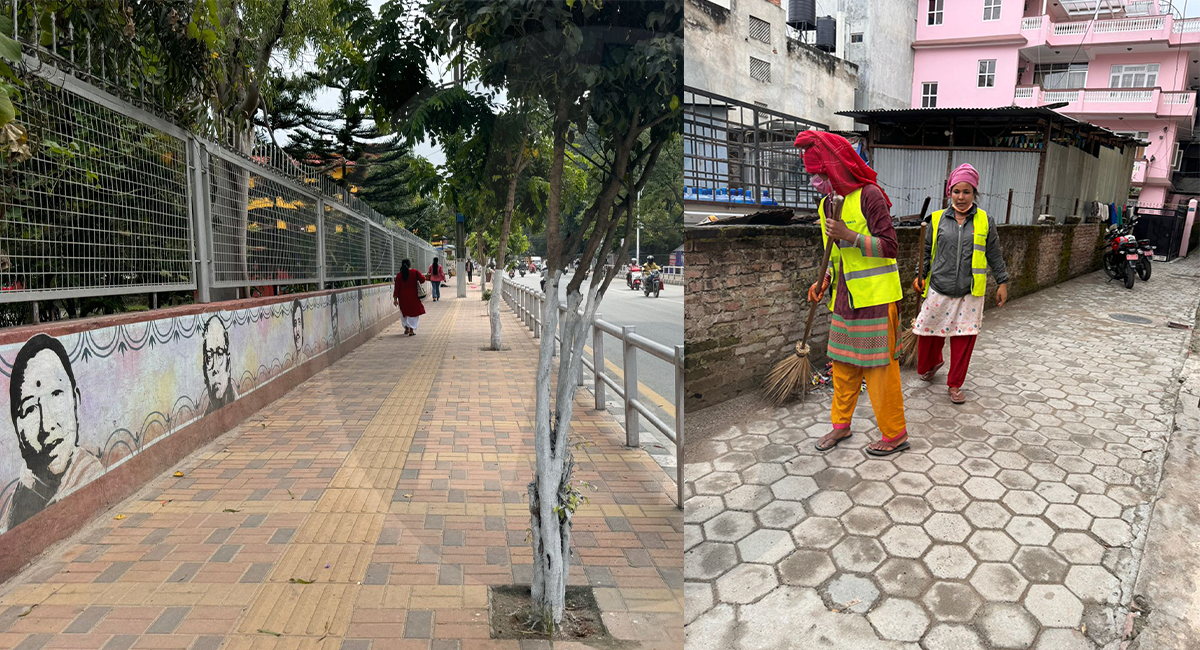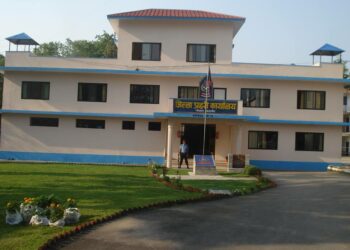KATHMANDU: Aman Kumar Singh, a visually impaired resident of Maitidevi, navigates the city with the help of a stick and his singing.
He used to struggle with the tactile paving on Kathmandu’s streets, which were often obstructed by piles of garbage.
Singh had to be exceptionally careful to avoid getting tangled in trash, but over the past year, the situation has markedly improved.
“Now, I can walk with ease. I don’t have to worry about fighting through dirt,” he says.
Previously, Kathmandu’s streets were so littered that people had to wear masks to avoid the stench.
Singh notes that this is no longer the case: “Even on the days when garbage is collected, people often neglect to put it out. However, now the streets are clean and neat, almost like flowers blooming along the sidewalks.”
Similarly, Binay Sigdel, who owns a stationery shop on Kathmandu Exhibition Road, praises the improvements.
A year ago, his shop was surrounded by garbage piles, making it an unpleasant place to work and forcing him to limit visits from family and friends.
“Crowded places should be cleaned in the morning and evening,” he says. The Metropolis is committed to monitoring these private sector areas closely to ensure compliance and cleanliness.
“The stench was unbearable. But now, the environment around my shop is clean. We used to have to close our noses due to the smell; now we can walk safely and enjoy a cleaner, more pleasant environment,” Sigdel explains.
Sigdel attributes these positive changes to the efforts of Balendra Shah, the current mayor of Kathmandu Metropolitan City.
Shah’s administration has implemented several measures to improve cleanliness, including daily road cleaning and maintenance regardless of weather conditions.

The establishment of new gardens on previously garbage-strewn areas is another example of these reforms.
According to Shah, these initiatives demonstrate how effective leadership can drive significant urban improvements.
“The current state of Kathmandu is a testament to how reform is possible with dedicated leadership,” he asserts.
This transformation is attributed to the efforts of the Kathmandu Metropolitan City, led by Balen.
“Even on the days when garbage is collected, people sometimes neglect to put it out. But now, the streets are clean and neat, almost like flowers blooming along the sidewalks,” Singh adds.
Improvements in Sanitation and Waste Management
Currently, Kathmandu Metropolitan City employs 1,000 sanitation workers, including garbage truck drivers and street cleaners.
Of these, 600 are permanent staff, while the rest are contracted through various companies.
Namraj Dhakal, Assistant Spokesperson for the Metropolis, notes that waste management responsibilities have been fully transferred to the Metropolis, and all related tasks are handled internally.
The city now operates 6 brooms and 5 jets for road cleaning—equipment that was previously underutilized.
With the new leadership in place, these tools are now being regularly deployed.
Additionally, the Metropolis has introduced tippers and tractors for garbage collection, and more equipment like excavators is being acquired.
The budget for waste management has been increased by approximately 20% to accommodate the expanded use of equipment and staff.
Dhakal explained that this budget increase is a result of the daily use of these tools and the need for additional resources. “The budget naturally increases with the addition of staff and equipment,” he says.
New Standards for Pollution Control
The Kathmandu Metropolitan Corporation has also developed standards for measuring air quality.
Dhakal confirmed that the executive has approved procedures to take action against polluters based on measurements of noise, water, soil, and air pollution. “We are establishing rules to address deliberate pollution,” he stated.
The Metropolis has acquired equipment to measure various types of pollution, which will help in monitoring and addressing environmental issues.
The newly imported equipment will provide detailed information on pollution levels, and various measurements will be taken to ensure compliance with environmental standards.
Daily Garbage Collection and Management
The Metropolis now manages garbage collection efficiently, with 250 tons of waste being collected daily.
In 12 wards, the city handles garbage collection directly, while in other areas, it is contracted out to private companies.
Despite wanting to manage all wards internally, some have been outsourced due to logistical challenges.
Each cluster will have a designated center for waste collection and transfer. For instance, Cluster 1 includes Wards 1 to 7, with the proposed waste transfer center located in Ward No. 7.
Dhakal assures that there is no official agreement with the private companies, but they are required to adhere to the Metropolis’s waste management standards.
“Crowded places should be cleaned in the morning and evening,” he says. The Metropolis is committed to monitoring these private sector areas closely to ensure compliance and cleanliness.

In the past two years, Kathmandu has seen a dramatic improvement in waste management, with no visible garbage in the streets.
“We are continuously monitoring the areas managed by private companies to ensure they meet our standards,” Dhakal concludes.
Moving Forward in River Management and Waste Collection
Kathmandu Metropolitan City is intensifying its efforts in river management with a comprehensive campaign supported by various organizations.
According to Spokesperson Dhakal, merely removing plastics and bottles from the rivers is not sufficient for a lasting solution. Instead, the city is focusing on finding long-term strategies to address the root causes of river pollution.
The metropolis is expanding its river cleaning campaign into a broader initiative that goes beyond surface-level cleaning.
One key aspect of this plan involves tackling the issue of sewage and wastewater being discharged into the rivers.
Dhakal explains that the city is working on creating a separate corridor along the riverbanks to channel this wastewater away from the rivers. This measure aims to improve water quality and river health significantly.
In addition to cleaning efforts, Kathmandu has also made progress in managing river flooding.
Under this new system, waste collected from households and other points will be transported to these cluster centers, where it will then be directed to the final dumping sites.
Dhakal notes that this year has seen a reduction in flooding compared to previous monsoons. Improved river cleanliness has contributed to better water flow and fewer blockages.
“Last year’s flooding was severe, but this year, the reduction in garbage has allowed the water to flow more freely,” Dhakal states.
The city is also reorganizing its waste management system into seven clusters to improve efficiency.
Each cluster will have a designated center for waste collection and transfer. For instance, Cluster 1 includes Wards 1 to 7, with the proposed waste transfer center located in Ward No. 7.
Similarly, Cluster 2, which covers Wards 10, 11, 28, 29, and 30, will have its center in Ward No. 11.
Other clusters include Wards 6, 8, and 9, with a proposed center in Ward No. 6; Wards 16, 17, and 26, with a center in Ward No. 16; Wards 13, 14, and 15, with a center in Ward No. 14; Wards 31 and 32, with a center in Ward No. 31; and Wards 12, 18, 19, 20, 21, 22, 23, 24, and 25, with a center in Ward No. 12.
Under this new system, waste collected from households and other points will be transported to these cluster centers, where it will then be directed to the final dumping sites.
This reorganization aims to streamline waste management processes and enhance the overall efficiency of waste collection in Kathmandu.









Comment